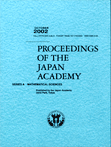
PROCEEDINGS OF THE JAPAN ACADEMY SERIES A-MATHEMATICAL SCIENCES
Scope & Guideline
Elevating the Discourse in Mathematical Sciences.
Introduction
Aims and Scopes
- Geometric and Algebraic Methods:
The journal features research that employs geometric and algebraic techniques to address complex mathematical problems, including topics like hyperbolic critical points and the structure of Coxeter groups. - Analytic and Topological Studies:
Papers often explore analytic spaces, topology, and geometric flows, reflecting a significant interest in the interplay between analysis and topology. - Number Theory and Modular Forms:
Research related to number theory, particularly modular forms, transcendental numbers, and Diophantine equations, is a consistent theme, showcasing the journal's commitment to foundational mathematical principles. - Representation Theory and Algebraic Geometry:
The journal publishes work on representation theory, algebraic structures, and their applications in algebraic geometry, including studies on K3 surfaces and Grassmannians. - Probabilistic and Combinatorial Mathematics:
There is a notable focus on probabilistic methods and combinatorial constructs, as seen in studies involving random walks and combinatorial identities.
Trending and Emerging
- High-Dimensional Analysis:
There is an increasing interest in high-dimensional problems, as evidenced by works on Kakeya's maximal function and complex flows, reflecting the growing complexity of studies in analysis. - Advanced Algebraic Structures:
Emerging themes include the exploration of advanced algebraic structures such as Hopf algebras and quantum affine algebras, indicating a trend towards deeper algebraic investigations. - Interdisciplinary Applications of Mathematics:
Recent papers suggest a trend towards applying mathematical concepts to interdisciplinary problems, including connections to physics and computational models. - Cohomological and Homological Methods:
An uptick in research utilizing cohomological and homological methods, particularly in the context of algebraic geometry and number theory, signifies a growing sophistication in these areas. - Mathematical Physics and Geometry:
The intersection of mathematical physics and geometry is becoming increasingly prominent, as seen in studies of geodesic flows and complex projective spaces, reflecting a broader trend of applying geometric methods to physical theories.
Declining or Waning
- Classical Geometry:
Papers focusing on traditional aspects of geometry, such as classical constructions and properties, have declined, possibly due to the shift towards more abstract and computational approaches. - Elementary Number Theory:
The frequency of research specifically dedicated to elementary number theory topics seems to be waning, with fewer papers on foundational number theoretic concepts. - Basic Combinatorial Techniques:
While combinatorial mathematics is still present, basic combinatorial techniques are becoming less prominent, suggesting a move towards more complex applications and theories.
Similar Journals
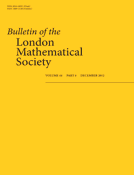
BULLETIN OF THE LONDON MATHEMATICAL SOCIETY
Exploring Innovative Research in MathematicsThe BULLETIN OF THE LONDON MATHEMATICAL SOCIETY, published by Wiley, is a distinguished journal that serves as a vital resource in the field of mathematics. With its ISSN 0024-6093 and E-ISSN 1469-2120, this journal has consistently provided a platform for innovative research and scholarly discourse since its inception in 1969. Recognized for its quality, it currently holds an impressive Q1 ranking in the mathematics category, a testament to its significance in disseminating influential findings and trends in the mathematical sciences. Researchers and practitioners can rely on the BULLETIN for its comprehensive coverage of both theoretical and applied mathematics, which caters to a diverse audience ranging from professionals to students alike. Though it does not currently offer Open Access options, its articles can be accessed through institutional subscriptions, ensuring that significant works reach the academic community effectively. With contributions that span over five decades, the journal continues to shape mathematical research and inspire future advancements in the discipline.

Cambridge Journal of Mathematics
Advancing Mathematical Frontiers with Every IssueCambridge Journal of Mathematics, published by INT PRESS BOSTON, INC, is a premier platform for the dissemination of cutting-edge research in the field of mathematics. With an ISSN of 2168-0930 and E-ISSN 2168-0949, this journal stands out in a competitive academic landscape, currently ranked #58 out of 399 in General Mathematics, placing it in the top 15% within its category according to Scopus metrics. The journal serves as a vital resource for researchers, professionals, and students alike, aiming to foster groundbreaking mathematical inquiries and foster collaboration across disciplines. Published from 2020 to 2024, the Cambridge Journal of Mathematics is committed to maintaining high standards of scholarship, making it an essential read for those who are passionate about advancing mathematical knowledge and its applications.
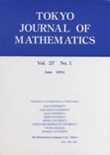
Tokyo Journal of Mathematics
Exploring the Depths of Mathematical Theory and ApplicationTokyo Journal of Mathematics is a prestigious journal dedicated to the dissemination of high-quality research in the field of mathematics. Founded in 1978, this journal serves as a platform for researchers to publish their findings, providing cutting-edge insights into various mathematical theories and applications. Published by the TOKYO JOURNAL MATHEMATICS EDITORIAL OFFICE ACAD CENTER, the journal is based in Japan and forms an integral part of the global mathematical community. Although listed in the Q4 quartile of Mathematics (Miscellaneous) category for 2023, its inclusion in Scopus rankings highlights its ongoing commitment to scholarly excellence. The journal does not currently offer Open Access options, thus providing readers with insightful access to critical advancements in mathematics. With an ISSN of 0387-3870 and a publication history spanning over four decades, the Tokyo Journal of Mathematics remains an essential resource for researchers, professionals, and students alike, fostering the advancement of mathematical knowledge and collaboration across borders.
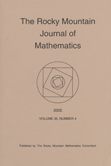
ROCKY MOUNTAIN JOURNAL OF MATHEMATICS
Fostering Collaboration in Diverse Mathematical FieldsROCKY MOUNTAIN JOURNAL OF MATHEMATICS, published by the Rocky Mountain Math Consortium, serves as a critical platform for researchers and practitioners in the field of mathematics since its inception in 1971. With a notable presence in the academic community, this journal covers a broad spectrum of mathematical disciplines, positioning itself in the Q2 category for Mathematics (miscellaneous) as of 2023. Despite being a subscription-based journal, it is recognized for its rigorous peer-review process and contributions to theoretical and applied mathematics, helping to advance knowledge and foster collaboration among mathematicians. The journal's ISSN number is 0035-7596 and its E-ISSN is 1945-3795, reflecting its commitment to accessibility and dissemination of high-quality research. Based in Tempe, Arizona, at Arizona State University, the journal continues to play an important role in shaping contemporary mathematical discourse through well-researched articles and innovative studies, aiming to bridge gaps between various mathematical subfields and engage a diverse audience, including students and established researchers alike.

MICHIGAN MATHEMATICAL JOURNAL
Unveiling New Perspectives in Mathematics Since 1996The MICHIGAN MATHEMATICAL JOURNAL is a prestigious and influential publication in the field of mathematics, founded by the University of Michigan. With an ISSN of 0026-2285 and an E-ISSN of 1945-2365, this journal is recognized for its high-quality research and has achieved a commendable Q1 ranking in the category of Mathematics (miscellaneous) as of 2023. Published by the esteemed Michigan Mathematical Journal, it provides a platform for the dissemination of innovative mathematical theories and findings, playing a crucial role in advancing knowledge and scholarship within the mathematical community. With coverage spanning from 1996 to 2024, the journal emphasizes rigorous theoretical development and fosters collaboration among researchers, professionals, and students alike. While not an open-access journal, its contributions are invaluable for those looking to stay abreast of cutting-edge mathematical research.
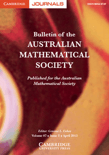
BULLETIN OF THE AUSTRALIAN MATHEMATICAL SOCIETY
Elevating Mathematics: A Journal of DistinctionBULLETIN OF THE AUSTRALIAN MATHEMATICAL SOCIETY is an esteemed journal dedicated to advancing the field of mathematics, published by Cambridge University Press. Since its inception in 1969, this periodical has fostered scholarly communication and showcased pivotal research in various domains of mathematics, now projected to continue until 2024. With an impact factor that places it in the Q2 category of miscellaneous mathematics research, it holds a notable position among its peers, ranking 215th out of 399 in the Scopus database. Though it does not currently offer open access options, the journal remains a vital resource for researchers, professionals, and students seeking to deepen their understanding of mathematical advancements. The Bulletin serves as a crucial platform for disseminating original research, comprehensive reviews, and insightful perspectives that navigate the complexities of mathematics today, ensuring the community is well-informed and engaged.

Beitrage zur Algebra und Geometrie-Contributions to Algebra and Geometry
Connecting Scholars through Algebra and GeometryBeitrage zur Algebra und Geometrie - Contributions to Algebra and Geometry is a distinguished journal published by Springer Heidelberg, situated in Germany. With a focus on the intricate fields of Algebra and Number Theory and Geometry and Topology, this journal serves as a pivotal platform for the dissemination of innovative research and critical insights from scholars worldwide. Holding a commendable Q3 category ranking in both disciplines as of 2023, it is recognized for its contribution to advancing theoretical foundations and practical applications. The journal has consistently engaged the mathematical community since its inception in 2000, with a specific publication timeline that spans 2000 to 2002 and 2004 to 2024. Despite its absence of open-access options, the journal's articles are pivotal for researchers, professionals, and students seeking authoritative and impactful studies in algebra and geometry. Join an esteemed readership eager to explore and expand upon the boundaries of mathematical inquiry through this exceptional publication.

Epijournal de Geometrie Algebrique
Unlocking the Secrets of TopologyEpijournal de Geometrie Algebrique is an esteemed open-access journal dedicated to advancing the fields of Algebra and Number Theory, as well as Geometry and Topology. Published by the CENTRE COMMUNICATION SCIENTIFIQUE DIRECTE-CCSD in France, this journal has gained recognition for its commitment to disseminating high-quality research since its inception in 2017. With an impressive positioning in the prestigious Q1 quartile for both categories as of 2023, it occupies a notable space in the academic landscape. The journal aims to provide a platform for scholars to share innovative findings and foster collaborations within the mathematical community. Researchers, professionals, and students will find valuable resources, insights, and a vibrant forum for discussion in this journal, which reflects the dynamic evolution of algebraic and geometric studies. Access to all articles is freely available, ensuring that knowledge is accessible to a broader audience, thus promoting ongoing discourse and discovery in these critical branches of mathematics.

PUBLICATIONES MATHEMATICAE DEBRECEN
Elevating Knowledge in Mathematics Since 1997Publicationes Mathematicae Debrecen is a renowned international journal published by the University of Debrecen, Institute of Mathematics, situated in Hungary. This journal, with both ISSN 0033-3883 and E-ISSN 2064-2849, has established itself in the field of mathematics since its inception, with coverage extending from 1997 to 2024. Recognized for its rigorous academic standards, it currently holds a Q3 ranking in the mathematics (miscellaneous) category for 2023 and ranks at the 42nd percentile among general mathematics journals in Scopus. Publicationes Mathematicae Debrecen aims to disseminate high-quality research across various areas of mathematics, contributing to the advancement of knowledge and practice in this dynamic field. Although it is not an open-access journal, its readers can access a wealth of scholarly work that addresses both theoretical and applied mathematical issues, making it an invaluable resource for researchers, professionals, and students alike.
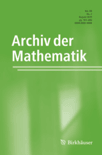
ARCHIV DER MATHEMATIK
Pioneering Research in the Heart of MathematicsARCHIV DER MATHEMATIK is a distinguished journal published by SPRINGER BASEL AG, renowned for its contributions to the field of mathematics. Established in 1948 and continuing its legacy through to 2024, the journal provides a platform for innovative research and scholarly articles that push the boundaries of mathematical theory and application. With an ISSN of 0003-889X and an E-ISSN of 1420-8938, it holds a reputable position within the academic community, reflected by its Q2 ranking in the 2023 Mathematics (Miscellaneous) category. Despite not being an open access publication, ARCHIV DER MATHEMATIK remains accessible to a global audience through various databases, ensuring the dissemination of high-quality research. The journal’s commitment to enhancing mathematical discourse makes it an essential resource for researchers, professionals, and students seeking to expand their understanding of this vital discipline.